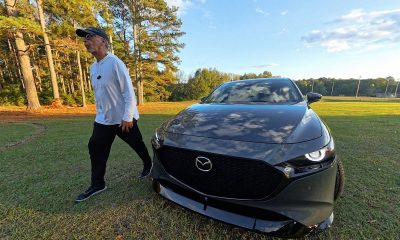Business
Car Review: 2015 Honda CR-V
By Frank S. Washington
NNPA Columnist
NORTHVILLE, Mich. – Honda called it a major minor model change. The automaker increased the fuel economy and added another trim line to the 2015 Honda CR-V. But they also improved their best-selling entry level crossover vehicle in 60 other areas. For 2015, the Honda CR-V has a new grille, new headlights, new front bumper, new skid plate and a tweaked front suspension.
The rear end had a new fascia, new license housing and new rear bumper. It looked wider from the rear and now the crossover can be equipped with 18-inch wheels, in addition to its normal 17-inch rubber. LED running lights are also available, a power tailgate is now offered and there is an available smart key.
The interior has gone high tech, too. It had dual information screens. The center console was configurable and it could hold an iPad, large soft drink cups from fast food outlets and had easily reachable USB ports. The dash had a clean saddle bag look to it as each soft touch layer flowed down to a thin wood-like trim that spanned across its width.
The interior had a high quality look but Honda would do well to upgrade the polymer used in the frames that hold the CR-V’s climate vents. They didn’t match the quality of materials used in the rest of the interior.
Although horsepower stayed the same at 185 on the 2.4-liter aluminum alloy four cylinder engine, torque has been increased by 11 percent to 181 pound-feet. To improve fuel economy, Honda switched the CR-V from a five-speed automatic transmission to a continuously variable transmission or CVT.
The fuel consumption rating for the 2015 Honda CR-V, which went on sale in October, is 27 mpg in the city, 34 mpg on the highway, and 29 mpg combined for the front-wheel-drive model and 26 mpg in the city, 33 mpg on the highway and 28 mpg combined for the all-wheel-drive version.
We thought the new 2.4-liter engine ran smoothly and power was decent. Although we’ve never been a fan of a CVT, this generation of pulley-type transmission was pretty quiet at low speeds. Still, though CVTs save fuel, we question how effective they are at transmuting engine torque to power on the pavement.
Another idiosyncrasy of CVTs is that under hard acceleration they drone on with seemingly no break in the sound because they don’t shift gears. Under our heavy foot, the Honda 2015 CR-V seemed not to be moving as fast as it sounded. But a check of the speedometer and yes, we were moving swiftly.
Our test vehicle had all-wheel drive. The system was really front-wheel drive on dry pavement but it was capable of sending 20 percent of the engine’s torque to the rear wheels once any slip of the front wheels was detected.
The 2015 CR-V’s steering could have been a little tighter but the vehicle still responded to driver input quickly. When test driving so many different vehicles, it is not a bad idea to keep in mind who is the target buyer. For the 2015 Honda CR-V, it is a 32-year-old mother of two. In other words, the CR-V is not supposed to handle like a sports car or a performance sedan.
To appeal to mothers of young children, the 2015 CR-V can be equipped with the Honda Sensing system. It includes forward collision warning, a collision mitigating braking system, lane departure warning, lane keeping assist, adaptive cruise control and Honda Lane watch. The lane watch system is unique, we think, to Honda. A camera at the bottom of the right side-view mirror will show on the navigation screen what is in the right hand lane when the right turn signal is activated or when a button at the tip of the turn signal stalk is pressed.
This equipment was packaged as a safety suite and safety is preeminent to most female car buyers. Honda is targeting young mothers with the 2015 CR-V and a vehicle with outstanding safety features is at the top of their shopping lists.
Prices for the 2015 Honda CR-V cover a variety of incomes. There are four trim lines: the LX, the EX, the EX-L and the Touring. A front-wheel drive LX starts at $23,320 the price range goes up to the top of the line Touring with all-wheel-drive. An EX-L starts at $32,770. Honda is putting its best tread forward, so to speak, to stay atop the entry level crossover market.
Frank S. Washington is editor of AboutThatCar.com.
###
Activism
OP-ED: AB 1349 Puts Corporate Power Over Community
Since Ticketmaster and Live Nation merged in 2010, ticket prices have jumped more than 150 percent. Activities that once fit a family’s budget now take significant disposable income that most working families simply don’t have. The problem is compounded by a system that has tilted access toward the wealthy and white-collar workers. If you have a fancy credit card, you get “presale access,” and if you work in an office instead of a warehouse, you might be able to wait in an online queue to buy a ticket. Access now means privilege.

By Bishop Joseph Simmons, Senior Pastor, Greater St. Paul Baptist Church, Oakland
As a pastor, I believe in the power that a sense of community can have on improving people’s lives. Live events are one of the few places where people from different backgrounds and ages can share the same space and experience – where construction workers sit next to lawyers at a concert, and teenagers enjoy a basketball game with their grandparents. Yet, over the past decade, I’ve witnessed these experiences – the concerts, games, and cultural events where we gather – become increasingly unaffordable, and it is a shame.
These moments of connection matter as they form part of the fabric that holds communities together. But that fabric is fraying because of Ticketmaster/Live Nation’s unchecked control over access to live events. Unfortunately, AB 1349 would only further entrench their corporate power over our spaces.
Since Ticketmaster and Live Nation merged in 2010, ticket prices have jumped more than 150 percent. Activities that once fit a family’s budget now take significant disposable income that most working families simply don’t have. The problem is compounded by a system that has tilted access toward the wealthy and white-collar workers. If you have a fancy credit card, you get “presale access,” and if you work in an office instead of a warehouse, you might be able to wait in an online queue to buy a ticket. Access now means privilege.
Power over live events is concentrated in a single corporate entity, and this regime operates without transparency or accountability – much like a dictator. Ticketmaster controls 80 percent of first-sale tickets and nearly a third of resale tickets, but they still want more. More power, more control for Ticketmaster means higher prices and less access for consumers. It’s the agenda they are pushing nationally, with the help of former Trump political operatives, who are quietly trying to undo the antitrust lawsuit launched against Ticketmaster/Live Nation under President Biden’s DOJ.
That’s why I’m deeply concerned about AB 1349 in its current form. Rather than reining in Ticketmaster’s power, the bill risks strengthening it, aligning with Trump. AB 1349 gives Ticketmaster the ability to control a consumer’s ticket forever by granting Ticketmaster’s regime new powers in state law to prevent consumers from reselling or giving away their tickets. It also creates new pathways for Ticketmaster to discriminate and retaliate against consumers who choose to shop around for the best service and fees on resale platforms that aren’t yet controlled by Ticketmaster. These provisions are anti-consumer and anti-democratic.
California has an opportunity to stand with consumers, to demand transparency, and to restore genuine competition in this industry. But that requires legislation developed with input from the community and faith leaders, not proposals backed by the very company causing the harm.
Will our laws reflect fairness, inclusion, and accountability? Or will we let corporate interests tighten their grip on spaces that should belong to everyone? I, for one, support the former and encourage the California Legislature to reject AB 1349 outright or amend it to remove any provisions that expand Ticketmaster’s control. I also urge community members to contact their representatives and advocate for accessible, inclusive live events for all Californians. Let’s work together to ensure these gathering spaces remain open and welcoming to everyone, regardless of income or background.
Activism
Oakland Post: Week of December 31, 2025 – January 6, 2026
The printed Weekly Edition of the Oakland Post: Week of – December 31, 2025 – January 6, 2026

To enlarge your view of this issue, use the slider, magnifying glass icon or full page icon in the lower right corner of the browser window.
Activism
Big God Ministry Gives Away Toys in Marin City
Pastor Hall also gave a message of encouragement to the crowd, thanking Jesus for the “best year of their lives.” He asked each of the children what they wanted to be when they grow up.

By Godfrey Lee
Big God Ministries, pastored by David Hall, gave toys to the children in Marin City on Monday, Dec. 15, on the lawn near the corner of Drake Avenue and Donahue Street.
Pastor Hall also gave a message of encouragement to the crowd, thanking Jesus for the “best year of their lives.” He asked each of the children what they wanted to be when they grew up.
Around 75 parents and children were there to receive the presents, which consisted mainly of Gideon Bibles, Cat in the Hat pillows, Barbie dolls, Tonka trucks, and Lego building sets.
A half dozen volunteers from the Big God Ministry, including Donnie Roary, helped to set up the tables for the toy giveaway. The worship music was sung by Ruby Friedman, Keri Carpenter, and Jake Monaghan, who also played the accordion.
Big God Ministries meets on Sundays at 10 a.m. at the Mill Valley Community Center, 180 Camino Alto, Mill Valley, CA Their phone number is (415) 797-2567.
-

 Bay Area4 weeks ago
Bay Area4 weeks agoPost Salon to Discuss Proposal to Bring Costco to Oakland Community meeting to be held at City Hall, Thursday, Dec. 18
-

 Activism4 weeks ago
Activism4 weeks agoMayor Lee, City Leaders Announce $334 Million Bond Sale for Affordable Housing, Roads, Park Renovations, Libraries and Senior Centers
-

 Activism4 weeks ago
Activism4 weeks agoOakland Post: Week of December 10 – 16, 2025
-

 Activism4 weeks ago
Activism4 weeks agoOakland School Board Grapples with Potential $100 Million Shortfall Next Year
-

 Arts and Culture4 weeks ago
Arts and Culture4 weeks agoFayeth Gardens Holds 3rd Annual Kwanzaa Celebration at Hayward City Hall on Dec. 28
-

 Activism4 weeks ago
Activism4 weeks ago2025 in Review: Seven Questions for Black Women’s Think Tank Founder Kellie Todd Griffin
-

 Advice4 weeks ago
Advice4 weeks agoCOMMENTARY: If You Don’t Want Your ‘Black Card’ Revoked, Watch What You Bring to Holiday Dinners
-

 Activism4 weeks ago
Activism4 weeks agoAnn Lowe: The Quiet Genius of American Couture























































